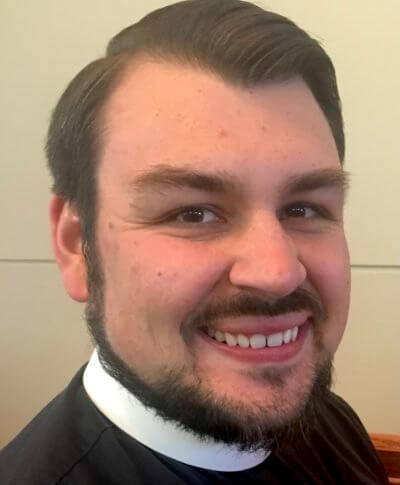by The Rev. Bryan Biba
The ecclesiastical trial of former Bishop Todd Atkinson is among the most significant Provincial-level Title IV disciplinary proceeding in the short history of the ACNA. The redacted Court Order as published by the Province on May 20, 2024[1] addresses a number of procedural issues that now function as canonical precedent.
- Jurisdiction
The court order begins with a procedural question regarding jurisdiction. Atkinson argued that the court did not have jurisdiction because most of the incidents in question occurred before he was accepted as a member of the College of Bishops. Although some members of the college were aware of the allegations against Atkinson at the time of his admission, they were apparently not directly addressed by the entire college.
The relevant questions are: can clergy persons be held canonically accountable for offenses committed before they were under orders? What about offenses committed while ordained in another jurisdiction?
The court concluded that its jurisdiction extends to any bishop “whose conduct at any time is brought to light in such a manner and way that it gives rise to a title IV offense.”[2] This is particularly the case if the conduct “give[s] just cause for scandal in a present and ongoing way.”[3] By implication, such jurisdiction should also apply to priests and deacons.
This precedent seems to establish an expansive view of canonical jurisdiction. In keeping with the qualifications for elders in Titus 1:6-7, the court order agrees that clergy must be “above reproach… and not open to the charge of debauchery or insubordination. For an overseer, as God’s steward, must be above reproach” (ESV). Future canonical proceedings dealing with Title IV offenses may include potential offenses committed by respondents before their ordained ministry in the ACNA as well as potential offenses committed while ordained in other jurisdictions.
- Statute of Limitations
These jurisdictional questions lead logically to questions regarding the statute of limitations. The amendments by Provincial Council and Assembly 2019 to Title IV, Canon 3, Section 3.2.a set the statute of limitations for any offense under Canon IV.2 at 10 years. However, the heading for Canon 3 reads “Of Presentments of Presbyters and Deacons”, suggesting the statute of limitations does not apply to bishops.
A plain reading of Title IV Canons 3 & 4 suggests at least two possible interpretations: 1) either by design or accident, there is no specific statute of limitations for potential offences committed by bishops or 2) since consecrated bishops always remain presbyters and deacons, the 10 year statute applies. The Atkinson Court Order tries to hold both interpretations together. The court begins by arguing “the lack of time specific statute of limitations for bishops should be construed that there is not a restrictive time period.”[4] Indeed, since “all bishops remain priests (and deacons)”[5] the statute of limitations applies to bishops.
Yet, the court goes on to argue that “surely the behavioral standards for bishops ought to be higher and more consistent throughout their lives than those of any others in leadership.”[6] What exactly does this mean? Citing Titus 1:7, the court argues “reputation, in the present, may be impacted by any actions at any time.”[7] While thankfully “past perfection is certainly not the standard…reputation in the faith and ministry after redemption is paramount.”[8] Since therefore “the actions of the respondent were in the context of his present ministry, not prior to his conversion”, his alleged behavior “impugns the biblical and canonical qualifications for being above reproach.”[9]
It seems that while particular canonical offences are subject to the statute of limitations, the consideration of a bishop’s general character and reputation is without limit. This distinction opens up a canonical grey area that will hopefully be sorted out through future judicial cases or canonical legislation.
- Seal of the Confessional
While the exact facts are unclear, the court order suggests that Atkinson believed an email sent to Archbishop Beach was under the seal of the confessional and thus intended to remain confidential. The court argued that the inclusion of the word “confession” is not sufficient for a disclosure to be considered under the seal of the confessional.
A number of context clues from the email indicate Atkinson’s intention “was something other than to engage in the rite of confession.”[10] Moreover, the document itself does not exhibit a humble and repentant tone characteristic of the “solemnity or the seriousness of the rite.”[11] There is no evidence that Atkinson sought absolution from Archbishop Beach after his email, again indicating that it should not be included under the confessional seal.
Given the denial of this affirmative defense, it is questionable whether an email could ever function as a means of confession.
- Spiritual Abuse
Recently the concept of spiritual abuse has become a hotly debated topic. For some spiritual abuse is an epidemic pervading the American church. For others it is a malicious attempt to undermine pastoral authority. As a subset of emotional abuse, spiritual abuse can be elusive. Yet the facts of the Atkinson case help brighten the line between emotional and spiritual abuse.
David Johnson and Jeff Van Vonderen’s now seminal 1991 work The Subtle Power of Spiritual Abuse defines spiritual abuse as “the mistreatment of a person who is in need of help, support or greater spiritual empowerment, with the result of weakening, undermining, or decreasing that person’s spiritual empowerment.”[12] This description fits well with the facts of the Atkinson case.
By his own admission, Atkinson engaged in his relationships of so-called “spiritual fathering” because these women were in need of healing. This claim gave him extraordinary spiritual authority in the lives of these women beyond his role as an ordained minister of word and sacrament. The result was a web of problematic power dynamics, both spiritual and temporal.
As an example, consider the case of Lisa Kremer: “the respondent began to disclose confidential and negative information about her husband including the fact that he was receiving bad work reviews at his work where the respondent served as her husband’s employer, Bishop, and congregational Pastor. The Respondent intimated to Lisa that he knew God’s plans for her husband.”[13] When the relational lines are blurred to this degree, spiritual abuse is all but inevitable.
Beyond these problematic relational power dynamics, spiritual abuse was particularly evident in Atkinson’s claim to speak for God: “He informed Lisa that his role was that of the voice of God and that because of her past trauma she was unable to discern the right way forward and that she was to listen and rely on him for her direction.”[14] The primary function of ordained ministers is to be faithful servants of the Word of God. We speak with ‘the voice of God’ only to the degree that we faithfully interpret and proclaim the promises of God contained within Holy Scripture. Clergy should always be wary of claiming direct prophetic powers to know and communicate the will of God apart from revealed biblical authority.
Conclusions
The court order is clear that Atkinson failed to disclose the details regarding his past alleged offences, as well as the existence of a recent investigation by his own congregation into his alleged behavior. While Atkinson himself is responsible for his deceptive lack of candor on Via Apostolica’s application to the ACNA, the failure of his admission process reveals serious flaws in the canons. The court order agrees: “the respondent’s failure has and will erode trust in the process outlined in our canons for the selection of a bishop as well as undermine the integrity of the college as a whole.”[15]
How can trust be restored? Title III Canon 5.4 stipulates that “No Bishop from another jurisdiction not in Communion with this Church shall be received as a Bishop of this Church except by the consent of the College of Bishops and in accordance with the Canons of this Church.” Given Atkinson’s conviction and deposition, it’s fair to say that canonical amendments may be in order. Here are some of the relevant questions:
- Should the College of Bishops alone be responsible for admitting new bishops (and their congregations) into their ranks? Or should the canons also require consent by Provincial Council and/or Assembly?
- If the College of Bishops desires to maintain sole responsibility for this process, are their procedural safeguards that could enhance it? Canonical amendments could detail specific requirements such as minimum standards for due diligence, prescribed waiting periods, and/or a process for provisional membership.
- Given that some members of the College of Bishops were aware of past investigations into Atkinson, perhaps there should be a canon prescribing a duty to disclose under penalty of Title IV ecclesiastical discipline?
Canon law works best when the church uses judicial proceedings as opportunities to reform. While there is much work left to be done, those desiring to see reform should be encouraged by the Atkinson affair. If our pursuit of justice is to be grounded in truth, then we must allow Provincial institutions the time necessary to seek the truth. We must trust the promise of our Lord Jesus Christ, “when the Spirit of truth comes, he will guide you into all truth” (John 16:13, ESV). By God’s grace through good order, the Atkinson case is the fruit of such patient truth seeking guided by the Holy Spirit. To God be the glory for our good and the good of all his holy church.

About the Rev. Bryan Biba: The Rev. Bryan Biba is an Anderson Trane Fellow and is Assistant Rector at Christ Church, Savannah, GA. He was born and raised in Chicagoland. He graduated from Wheaton College (Illinois) with a bachelor’s degree in political science and a master’s degree in theology. Bryan also earned a Master of Divinity with a certificate in Anglican Studies from Duke Divinity School in Durham, North Carolina. Bryan and his wife, Laura McClain-Biba, enjoy cooking good food, reading old books, biking, and spending time with their son, Simeon, and daughters, Adelaide and Miryam.
[1] In the matter of The Rt. Rev. Todd Atkinson Bishop, Via Apostolica Missionary District ORDER by the Ecclesiastical Court for the Trial of a Bishop Anglican Church in North America, published 20 May 2024 at https://anglicanchurch.net/court-for-the-trial-of-a-bishop/#1699296907315-186a278b-8a73.
[2] Ibid pg. 4.
[3] Ibid pg. 4.
[4] Ibid pg. 7.
[5] Ibid pg. 7.
[6] Ibid pg. 7.
[7] Ibid pg. 7.
[8] Ibid pg. 7.
[9] Ibid pg. 7.
[10] Ibid pg. 8.
[11] Ibid pg. 8.
[12] Johnson, David and Jeff Van Vonderen, The Subtle Power of Spiritual Abuse (Bethany House Publishers: Bloomington, MN, 1991) pg. 20.
[13] Atkinson Court Order pg. 20.
[14] Ibid pg. 22.
[15] Ibid pg. 16.


